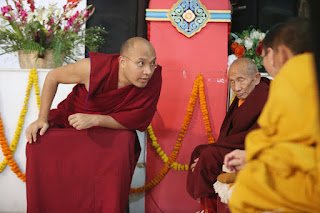Dharma is the single medicine for what fundamentally ails us all.
 Dharma is the only cure for suffering and the causes of suffering.
Dharma is the only cure for suffering and the causes of suffering. It is necessary to be concerned with and to hope for the long survival of the Dharma until all beings are cured of samsara/suffering and its causes.
These six perceptions should be applied in an appropriate manner in each distinct juncture at which we listen to the teachings.
His Holiness, 17th Gyalwang Karmapa
Ogyen Trinley Dorje




























